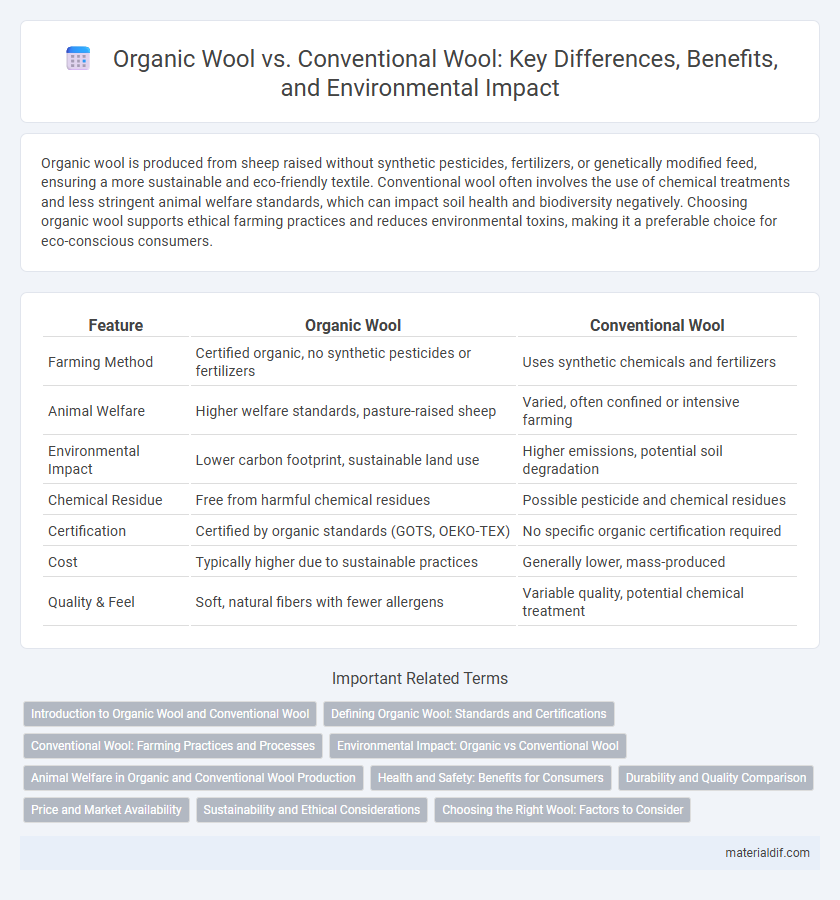Organic wool is produced from sheep raised without synthetic pesticides, fertilizers, or genetically modified feed, ensuring a more sustainable and eco-friendly textile. Conventional wool often involves the use of chemical treatments and less stringent animal welfare standards, which can impact soil health and biodiversity negatively. Choosing organic wool supports ethical farming practices and reduces environmental toxins, making it a preferable choice for eco-conscious consumers.
Table of Comparison
| Feature | Organic Wool | Conventional Wool |
|---|---|---|
| Farming Method | Certified organic, no synthetic pesticides or fertilizers | Uses synthetic chemicals and fertilizers |
| Animal Welfare | Higher welfare standards, pasture-raised sheep | Varied, often confined or intensive farming |
| Environmental Impact | Lower carbon footprint, sustainable land use | Higher emissions, potential soil degradation |
| Chemical Residue | Free from harmful chemical residues | Possible pesticide and chemical residues |
| Certification | Certified by organic standards (GOTS, OEKO-TEX) | No specific organic certification required |
| Cost | Typically higher due to sustainable practices | Generally lower, mass-produced |
| Quality & Feel | Soft, natural fibers with fewer allergens | Variable quality, potential chemical treatment |
Introduction to Organic Wool and Conventional Wool
Organic wool is produced from sheep raised without synthetic pesticides, fertilizers, or genetically modified organisms, ensuring eco-friendly and sustainable farming practices. Conventional wool, on the other hand, often involves chemical treatments and intensive farming methods that may impact soil health and biodiversity. Choosing organic wool supports animal welfare standards and reduces environmental pollutants compared to conventional wool production.
Defining Organic Wool: Standards and Certifications
Organic wool is produced without synthetic pesticides, herbicides, or fertilizers, adhering strictly to standards set by organizations such as the Global Organic Textile Standard (GOTS) and the Organic Content Standard (OCS). Certification processes involve verifying sustainable sheep farming practices, including animal welfare, land management, and chemical-free processing. These certifications ensure that organic wool maintains ecological balance, reduces environmental impact, and promotes ethical production throughout the supply chain.
Conventional Wool: Farming Practices and Processes
Conventional wool production relies on intensive sheep farming practices that often prioritize high yield over environmental sustainability, involving the use of synthetic pesticides and fertilizers on grazing lands. Sheep in conventional systems may experience more frequent shearing and less pasture rotation, which can lead to soil degradation and reduced biodiversity. These farming processes, while cost-effective for large-scale production, contribute to ecological impacts such as water pollution and increased greenhouse gas emissions from concentrated animal feeding operations.
Environmental Impact: Organic vs Conventional Wool
Organic wool production minimizes environmental impact by avoiding synthetic pesticides and fertilizers, promoting soil health, and supporting biodiversity. Conventional wool often relies on chemical inputs and intensive farming practices that contribute to soil degradation, water pollution, and greenhouse gas emissions. Choosing organic wool helps reduce carbon footprint and supports sustainable agriculture efforts in sheep farming.
Animal Welfare in Organic and Conventional Wool Production
Organic wool production prioritizes animal welfare by adhering to strict standards such as providing animals with access to pasture, prohibiting harmful chemicals, and avoiding mulesing practices. Conventional wool farming often involves more intensive practices that may include restricted grazing and the use of chemical treatments, which can negatively impact sheep health and well-being. Studies indicate organic wool farms typically demonstrate better living conditions, lower stress levels, and higher overall animal welfare compared to conventional wool operations.
Health and Safety: Benefits for Consumers
Organic wool contains significantly fewer chemical residues compared to conventional wool, reducing the risk of skin irritation and allergic reactions for sensitive consumers. The absence of synthetic pesticides and fertilizers in organic wool production ensures a safer and more environmentally friendly textile. Consumers benefit from enhanced breathability and natural moisture-wicking properties, promoting better skin health and comfort.
Durability and Quality Comparison
Organic wool typically exhibits superior durability due to sustainable farming practices that promote healthy sheep and stronger fibers. Conventional wool may contain residues of pesticides or chemicals that can weaken fiber quality over time. The higher microscopic fiber tensile strength in organic wool contributes to enhanced longevity and maintains its natural softness and resilience better than conventional alternatives.
Price and Market Availability
Organic wool typically commands a higher price due to sustainable farming practices and certification costs, while conventional wool is more affordable and widely available in global markets. Limited organic wool production results in smaller supply chains and niche market presence, contrasting with the mass production and extensive distribution networks of conventional wool. Consumer demand for eco-friendly products is gradually increasing organic wool's market share despite its premium price point.
Sustainability and Ethical Considerations
Organic wool is produced without synthetic pesticides or fertilizers, promoting healthier soil and reducing environmental pollution compared to conventional wool farming. Ethical considerations in organic wool include higher animal welfare standards, such as banning mulesing and ensuring natural grazing practices. Sustainability benefits stem from regenerative farming techniques that enhance biodiversity and lower carbon emissions, positioning organic wool as a more eco-friendly and responsible choice.
Choosing the Right Wool: Factors to Consider
Organic wool is produced without synthetic pesticides, fertilizers, or genetically modified organisms, ensuring a more sustainable and environmentally friendly choice compared to conventional wool. When choosing the right wool, consider factors such as animal welfare practices, the carbon footprint of production, and the presence of chemical residues, which are typically lower in organic wool. Additionally, organic wool often provides better skin sensitivity and hypoallergenic properties, making it suitable for individuals with allergies or sensitive skin.
Organic Wool vs Conventional Wool Infographic

 materialdif.com
materialdif.com